| Listing 1 - 10 of 16 | << page >> |
Sort by
|
Book
ISBN: 9780521198493 9781139014090 9781108465359 1108465358 0521198496 1316053318 131605568X 1316081699 1316074595 1316079333 1139014099 1316069877 1316072231 1316076962 1322176698 Year: 2014 Publisher: Cambridge: Cambridge university press,
Abstract | Keywords | Export | Availability | Bookmark
 Loading...
Loading...Choose an application
- Reference Manager
- EndNote
- RefWorks (Direct export to RefWorks)
"This is the first book to provide an account of the influence of Proclus, a member of the Athenian Neoplatonic School, during more than one thousand years of European history (ca 500-1600). Proclus was the most important philosopher of late antiquity, a dominant (albeit controversial) voice in Byzantine thought, the second most influential Greek philosopher in the later western Middle Ages (after Aristotle), and a major figure (together with Plotinus) in the revival of Greek philosophy in the Renaissance. Proclus was also intensively studied in the Islamic world of the Middle Ages and was a major influence on the thought of medieval Georgia. The volume begins with a substantial essay by the editor summarizing the entire history of Proclus' reception. This is followed by the essays of more than a dozen of the world's leading authorities in the various specific areas covered"--
Proclus, --- PHILOSOPHY / History & Surveys / Ancient & Classical --- PHILOSOPHY / History et Surveys / Ancient et Classical. --- Philosophie der Antike. --- Proclus Atheniensis phil. TLG 4036. --- Proclus --- Proclo, --- Proclo di Atene, --- Proclo di Costantinopoli, --- Proclo Licio Diadoco, --- Proclus Arabus, --- Proclus Diadochus --- Proclus Diadochus, --- Proclus Lycius, --- Prokl, --- Prokl Diadokh, --- Proklos, --- Proklos Diadochos, --- Proklus, --- Πρόκλος, --- Πρόκλος Πλατωνικός Διάδοχος, --- Πρόκλος Διάδοχος, --- פרוקלוס --- Proclus, - approximately 410-485
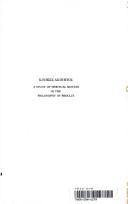
ISBN: 9004037845 9004320474 9789004037847 9789004320475 Year: 1973 Volume: 26 Publisher: Leiden, Brill
Abstract | Keywords | Export | Availability | Bookmark
 Loading...
Loading...Choose an application
- Reference Manager
- EndNote
- RefWorks (Direct export to RefWorks)
Motion --- Neoplatonism --- Mouvement --- Néo-platonisme --- Proclus, --- Kinetics --- Dynamics --- Physics --- Kinematics --- Proclus --- Motion. --- Proclus. --- Néo-platonisme --- Proclo, --- Proclo di Atene, --- Proclo di Costantinopoli, --- Proclo Licio Diadoco, --- Proclus Arabus, --- Proclus Diadochus --- Proclus Diadochus, --- Proclus Lycius, --- Prokl, --- Prokl Diadokh, --- Proklos, --- Proklos Diadochos, --- Proklus, --- Πρόκλος, --- Πρόκλος Πλατωνικός Διάδοχος, --- Πρόκλος Διάδοχος, --- פרוקלוס --- Proclus, - approximately 410-485
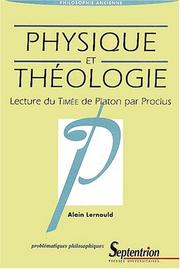
ISBN: 9782859396442 2859396446 Year: 2001 Publisher: Villeneuve d'Ascq: Presses universitaires du Septentrion,
Abstract | Keywords | Export | Availability | Bookmark
 Loading...
Loading...Choose an application
- Reference Manager
- EndNote
- RefWorks (Direct export to RefWorks)
Plato. --- Proclus, --- Plato --- Proclus --- Proclo, --- Proclo di Atene, --- Proclo di Costantinopoli, --- Proclo Licio Diadoco, --- Proclus Arabus, --- Proclus Diadochus --- Proclus Diadochus, --- Proclus Lycius, --- Prokl, --- Prokl Diadokh, --- Proklos, --- Proklos Diadochos, --- Proklus, --- Πρόκλος, --- Πρόκλος Πλατωνικός Διάδοχος, --- Πρόκλος Διάδοχος, --- פרוקלוס --- Physique --- Philosophie grecque. --- Aspect religieux. --- Platon --- Plato - Timaeus --- Proclus, - approximately 410-485 --- #gsdbF
Book
ISBN: 3110470373 3110471620 9783110471625 9783110470376 3110466996 Year: 2017 Publisher: Berlin/Boston De Gruyter
Abstract | Keywords | Export | Availability | Bookmark
 Loading...
Loading...Choose an application
- Reference Manager
- EndNote
- RefWorks (Direct export to RefWorks)
This volume investigates Proclus' own thought and his wide-ranging influence within late Neoplatonic, Alexandrine and Byzantinian philosophy and theology. It further explores how Procline metaphysics and doctrines of causality influence and transition into Arabic and Islamic thought, up until Richard Hooker in England, Spinoza in Holland and Pico in Italy. John Dillon provides a helpful overview of Proclus' thought, Harold Tarrant discusses Proclus' influence within Alexandrian philosophy and Tzvi Langermann presents ground breaking work on the Jewish reception of Proclus, focusing on the work of Joseph Solomon Delmedigo (1591-1655), while Stephen Gersh presents a comprehensive synopsis of Proclus' reception throughout Christendom. The volume also presents works from notable scholars like Helen Lang, Sarah Wear and Crystal Addey and has a considerable strength in its presentation of Pseudo-Dionysius, Proclus' transmission and development in Arabic philosophy and the problem of the eternity of the world. It will be important for anyone interested in the development and transition of ideas from the late ancient world onwards.
Neoplatonismus. --- Proclus. --- Proklos. --- Rezeption. --- neoplatonism. --- reception. --- PHILOSOPHY / History & Surveys / Ancient & Classical. --- Proclus, --- Proclo, --- Proclo di Atene, --- Proclo di Costantinopoli, --- Proclo Licio Diadoco, --- Proclus Arabus, --- Proclus Diadochus --- Proclus Diadochus, --- Proclus Lycius, --- Prokl, --- Prokl Diadokh, --- Proklos, --- Proklos Diadochos, --- Proklus, --- Πρόκλος, --- Πρόκλος Πλατωνικός Διάδοχος, --- Πρόκλος Διάδοχος, --- פרוקלוס --- Proclus --- neoplatonism --- reception
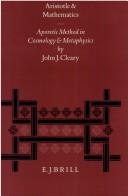
ISBN: 9789004320758 9789004094291 9004094296 900432075X Year: 1992 Volume: 53 Publisher: Leiden ;New York E.J. Brill
Abstract | Keywords | Export | Availability | Bookmark
 Loading...
Loading...Choose an application
- Reference Manager
- EndNote
- RefWorks (Direct export to RefWorks)
Proclus (c. 410 - 485) was one of the major Greek philosophers of late Antiquity. In his metaphysics he developed and systematized fundamental problems of Plato's thought, such as participation; transcendence - immanence; causation - participation - return; henads and monads. In a theological way he interpreted some of Plato's dialogues. In the tradition of the neo-platonic school of Athens he tried to bring together Orpheus, Pythagoras and Plato. Before and after his works had been translated into Latin, Proclus influenced the Christian West through the Liber de causis ('Book of Causes'), a Latin translation of an anonymous Arab version of his Elementatio theologica . Among those who commented on the Liber or on some of its theses, were many well-known philosophers: Albert the Great, Thomas Aquinas, Master Eckhart, Berthold of Moosberg and William of Ockham. The Liber de causis stimulated discussions about the concepts of God, first and second causality, universals, metaphysics of being as opposed to metaphysics of the one. In the volume various specialists discuss these problems: Saffrey, De Rijk, Meyer, Steel, De Libera, Aertsen, Beierwaltes and Bos.
Philosophy, Medieval - Congresses --- Philosophy, Medieval --- Philosophie médiévale --- Congresses --- Congrès --- Proclus, --- #GROL:SEMI-1-05'04' Proc --- Proclo, --- Proclo di Atene, --- Proclo di Costantinopoli, --- Proclo Licio Diadoco, --- Proclus Arabus, --- Proclus Diadochus --- Proclus Diadochus, --- Proclus Lycius, --- Prokl, --- Prokl Diadokh, --- Proklos, --- Proklos Diadochos, --- Proklus, --- Πρόκλος, --- Πρόκλος Πλατωνικός Διάδοχος, --- Πρόκλος Διάδοχος, --- פרוקלוס --- Congresses.
Book
ISBN: 316158161X 9783161581618 Year: 2019 Publisher: Tubingen : Mohr Siebeck,
Abstract | Keywords | Export | Availability | Bookmark
 Loading...
Loading...Choose an application
- Reference Manager
- EndNote
- RefWorks (Direct export to RefWorks)
Die Schrift Über das Glück: Das Leben des Proklos, verfasst von dem neuplatonischen Philosophen Marinos, ist ein bemerkenswerter Text des späten 5. Jh. n. Chr., der traditionelle biographische, hagiographische und philosophische Themen und Motive mit aktuellen zeitgenössischen Diskursen der Spätantike amalgamiert. Das langjährige Oberhaupt der Neuplatoniker in Athen, der Philosoph Proklos, wird als Leitfigur und paganer Heiliger in einer zunehmend christianisierten Gesellschaft inszeniert. Marinos illustriert anhand seiner Proklos-Figur die Tugenden und Ideale der neuplatonischen Philosophen und schildert dabei programmatisch die (neu-)platonische Ethik und Glückskonzeption. In der Einleitung sowie in den sieben Essays dieses Bandes werden literarische, philosophische, religionsphilosophische, astronomische wie althistorische und sozialgeschichtliche Themen dieses Textes - der hier zum ersten Mal ins Deutsche übersetzt wird - beleuchtet.
Biography in literature. --- Biographie --- Spätantike --- Neuplatonismus --- Hagiographie --- Philosphenviten --- Antike Religionsgeschichte --- Antike Philosophie --- Religionswissenschaft --- Allgemeines --- Alte Geschichte --- Editionen, Textausgaben --- Kommentare --- Kirchengeschichte --- Proclus, --- Proclo, --- Proclo di Atene, --- Proclo di Costantinopoli, --- Proclo Licio Diadoco, --- Proclus Arabus, --- Proclus Diadochus --- Proclus Diadochus, --- Proclus Lycius, --- Prokl, --- Prokl Diadokh, --- Proklos, --- Proklos Diadochos, --- Proklus, --- Πρόκλος, --- Πρόκλος Πλατωνικός Διάδοχος, --- Πρόκλος Διάδοχος, --- פרוקלוס
Book
ISBN: 9782252036662 2252036664 Year: 2010 Volume: 110 Publisher: Paris: Klincksieck,
Abstract | Keywords | Export | Availability | Bookmark
 Loading...
Loading...Choose an application
- Reference Manager
- EndNote
- RefWorks (Direct export to RefWorks)
Neoplatonism. --- Ammonius Saccas, --- Plotinus. --- Proclus, --- Neoplatonism --- Alexandrian school --- Church history --- Hellenism --- Philosophy --- Philosophy, Ancient --- Platonists --- Theosophy --- Proclo, --- Proclo di Atene, --- Proclo di Costantinopoli, --- Proclo Licio Diadoco, --- Proclus Arabus, --- Proclus Diadochus --- Proclus Diadochus, --- Proclus Lycius, --- Prokl, --- Prokl Diadokh, --- Proklos, --- Proklos Diadochos, --- Proklus, --- Πρόκλος, --- Πρόκλος Πλατωνικός Διάδοχος, --- Πρόκλος Διάδοχος, --- פרוקלוס --- Plotin --- Plotinos --- Alexandria, Ammonius Saccas of --- Ammonios Sakkas, --- Ammonius, --- Saccas --- Boluoding --- Iflūṭīn --- Plotino --- Plōtinos --- Plotinus, --- Plotyn --- Πλωτι̂νος --- פלוטינוס --- أفلوطين
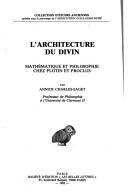
ISBN: 2251326030 9782251326030 Year: 1982 Publisher: Paris: Les Belles Lettres,
Abstract | Keywords | Export | Availability | Bookmark
 Loading...
Loading...Choose an application
- Reference Manager
- EndNote
- RefWorks (Direct export to RefWorks)
Neoplatonism --- Mathematics, Greek --- Néo-platonisme --- Mathématiques grecques --- Plotinus --- Proclus, --- Proclus --- Boluoding --- Iflūṭīn --- Plotin --- Plotino --- Plōtinos --- Plotinus, --- Plotyn --- Πλωτι̂νος --- פלוטינוס --- أفلوطين --- Plotinos --- Néo-platonisme --- Mathématiques grecques --- Plotinus. --- Proclo, --- Proclo di Atene, --- Proclo di Costantinopoli, --- Proclo Licio Diadoco, --- Proclus Arabus, --- Proclus Diadochus --- Proclus Diadochus, --- Proclus Lycius, --- Prokl, --- Prokl Diadokh, --- Proklos, --- Proklos Diadochos, --- Proklus, --- Πρόκλος, --- Πρόκλος Πλατωνικός Διάδοχος, --- Πρόκλος Διάδοχος, --- פרוקלוס --- Proclus, - approximately 410-485
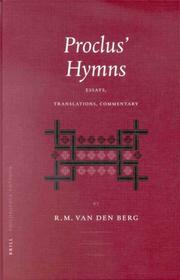
ISSN: 00791687 ISBN: 9004122362 9789004122369 9786610464869 1417507233 1280464860 9047401034 9781417507238 9789047401032 Year: 2001 Volume: 90 Publisher: Leiden ; Boston : Brill,
Abstract | Keywords | Export | Availability | Bookmark
 Loading...
Loading...Choose an application
- Reference Manager
- EndNote
- RefWorks (Direct export to RefWorks)
This book studies the hymns composed by the Neoplatonist Proclus in the context of his philosophy. Its main claim is that the hymns should be understood in the context of theurgy, the ritual art adopted by the Neoplatonists in order to obtain mystical experiences. The first part of the book consists of a series of essays which discuss the relation of the hymns to Proclus’ Neoplatonism, his theory of poetry, and especially to theurgy. The second part offers translations of the individual hymns together with a detailed commentary. This study will be of special interest to those working in the field of Neoplatonism and a helpful guide to scholars of Late Antique poetry and religion who wish to explore these intriguing, yet at times obscure poems.
Hymns, Greek (Classical) --- History and criticism. --- -History and criticism --- Proclus --- Hymnes grecs anciens --- History and criticism --- Histoire et critique --- Proclus, --- Proclo, --- Proclo di Atene, --- Proclo di Costantinopoli, --- Proclo Licio Diadoco, --- Proclus Arabus, --- Proclus Diadochus --- Proclus Diadochus, --- Proclus Lycius, --- Prokl, --- Prokl Diadokh, --- Proklos, --- Proklos Diadochos, --- Proklus, --- Πρόκλος, --- Πρόκλος Πλατωνικός Διάδοχος, --- Πρόκλος Διάδοχος, --- פרוקלוס --- Hymns [Greek ] (Classical) --- Hymns, Greek (Classical) - History and criticism.
Book
ISBN: 1107224594 1139365479 1280647299 9786613633347 113937799X 1139028049 113937513X 113937656X 1139371142 1139379429 9781139379427 9781139028042 9781139376563 9781139375139 9780521761482 0521761484 131662885X 9781316628850 Year: 2012 Publisher: New York : Cambridge University Press,
Abstract | Keywords | Export | Availability | Bookmark
 Loading...
Loading...Choose an application
- Reference Manager
- EndNote
- RefWorks (Direct export to RefWorks)
Proclus of Lycia (412-485) was one of the greatest philosophers of antiquity, producing the most systematic version of late Neoplatonic thought. He exercised enormous influence on Byzantine, medieval, Renaissance and German Classical philosophy, ranking among the top five of ancient philosophers in terms of the number of preserved works. Despite this he is rarely studied now, the enormous intricacy of his system making the reading of his treatises difficult for beginners. This book provides the first comprehensive introduction to all the basic areas of Proclus' thought. It carefully guides the reader through his metaphysics, theology, epistemology and theory of evil, as well as his sophisticated philosophy of religion. It also sets Proclus in the historical, social and religious context of late antiquity, offering a synthetic account that will appeal to historians and students of ancient religion.
Philosophy, Ancient. --- Ancient philosophy --- Greek philosophy --- Philosophy, Greek --- Philosophy, Roman --- Roman philosophy --- Proclus, --- Proclo, --- Proclo di Atene, --- Proclo di Costantinopoli, --- Proclo Licio Diadoco, --- Proclus Arabus, --- Proclus Diadochus --- Proclus Diadochus, --- Proclus Lycius, --- Prokl, --- Prokl Diadokh, --- Proklos, --- Proklos Diadochos, --- Proklus, --- Πρόκλος, --- Πρόκλος Πλατωνικός Διάδοχος, --- Πρόκλος Διάδοχος, --- פרוקלוס --- Néoplatonisme. --- Métaphysique. --- Théologie et philosophie. --- Philosophie grecque. --- Proclus --- Arts and Humanities --- History --- Polytheism --- Theology --- Metaphysics --- Proclus, - 412-485
| Listing 1 - 10 of 16 | << page >> |
Sort by
|

 Search
Search Feedback
Feedback About UniCat
About UniCat  Help
Help News
News